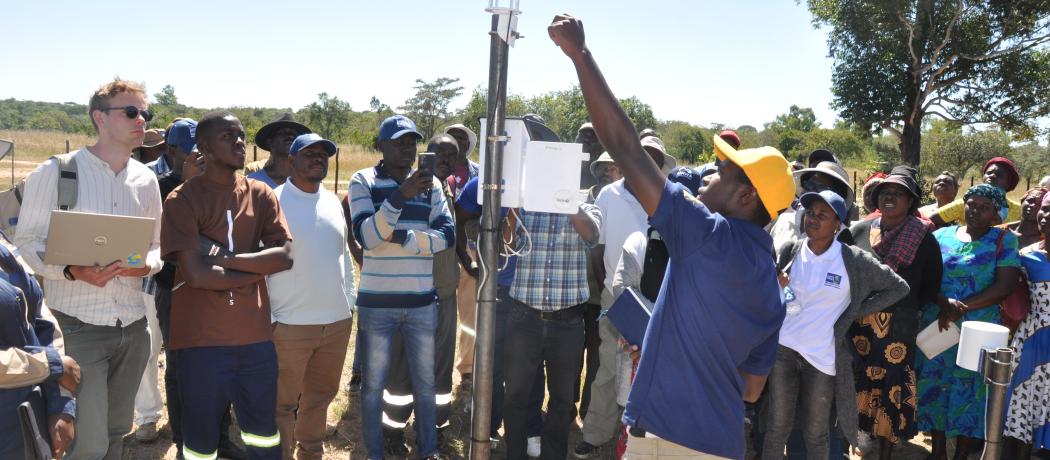
Zimbabwe's agricultural sector, a cornerstone of the national economy, is highly vulnerable to the intensifying impacts of climate change. The country faces increasingly erratic rainfall patterns, prolonged periods of drought, and more frequent and severe flooding, all of which significantly disrupt agricultural production. These climate-related challenges directly exacerbate existing issues of food insecurity, undermine efforts in disaster management, and contribute to the complex dynamics of rural-urban migration. Small-scale rainfed farmers, who constitute a substantial portion of Zimbabwe's farming population, are particularly susceptible to these climatic shifts, experiencing reduced crop yields and increased risks of complete crop failure. In response to these pressing challenges, the SAFE4ALL project has been initiated as a targeted intervention aimed at enhancing the resilience of local food systems and communities across Zimbabwe. The project adopts an innovative approach by focusing on the development and dissemination of scalable climate information services, recognizing that access to timely and relevant information is crucial for enabling effective adaptation strategies at the local level.
The SAFE4ALL project for Zimbabwe is a critical response to the pressing issues of food insecurity, disaster management, and migration that are increasingly being compounded by climate change. This project, executed in cooperation with the Meteorological Services Department (MSD) and the Zimbabwe Farmers' Union (ZFU), is supported by the European Union through the Horizon Europe Framework Programme and aimed at strengthening the resilience of local food systems and communities. The project strategy is essentially the provision of scalable climate information services, meant to empower local actors, most notably farmers, to undertake knowledge-informed choices that can stabilize farming activities and also counter the negative effects of extreme weather conditions like drought and flooding. By enhancing the resilience of the climate at the local level, SAFE4ALL seeks to ultimately decrease the causes of rural-urban migration, so that the community is in a position to address climatic stressors, while remaining food secure. The support of the project through the European Union in the Horizon Framework Programme is an indication of the commitment of the European Union to the area of adapting to climate change and sustainable development in the African region.
While specific details on the precise geographical focus within Zimbabwe are still emerging, the SAFE4ALL project has actively engaged with communities and stakeholders in regions such as Marondera, where needs assessment workshops and surveys have been conducted. The primary sectoral focus of the project is on agriculture and rural communities, recognizing the significant reliance of these groups on rainfed agriculture and their heightened vulnerability to climate variability and change.1 By targeting these sectors, SAFE4ALL aims to directly address the interconnected challenges of food security, disaster management, and migration that are most acutely felt by agricultural communities in Zimbabwe.1
The SAFE4ALL project in Zimbabwe is driven by several core objectives, all centered around enhancing the capacity of local communities and food systems to withstand and adapt to the impacts of climate change. A primary aim is to enhance food security by providing farmers with the necessary climate information to optimize their agricultural practices and reduce losses due to adverse weather conditions. Improving disaster preparedness and response is another critical objective, with the project working to strengthen early warning systems and provide communities with actionable information to mitigate the risks associated with extreme weather events. Furthermore, SAFE4ALL seeks to address the issue of climate-induced migration by building resilience within rural communities, thereby reducing the need for individuals to migrate to urban areas in search of more stable livelihoods. The project aims to achieve these objectives by empowering local stakeholders through the provision of user-centered and accessible climate information services, enabling them to make informed decisions that enhance their resilience to climate change.
The SAFE4ALL project leverages ZFU's extensive existing networks and well-established communication channels to effectively disseminate crucial climate information services and project updates to farmers throughout Zimbabwe. ZFU's hierarchical structure, with clubs at the local level and representative structures extending up to the national level, provides an efficient mechanism for reaching a large and diverse farming population. This partnership ensures that vital information, such as weather forecasts and agro advisories generated by the project, can be effectively communicated to farmers through trusted and familiar channels, increasing the likelihood of uptake and utilization in agricultural decision-making. Furthermore, ZFU plays a key role in ensuring that the overall goals of the SAFE4ALL project remain aligned with the evolving needs and challenges faced by local farmers, providing a crucial feedback loop that helps to tailor the project's interventions for maximum impact.
Meteorological Services Department
A cornerstone of the SAFE4ALL project in Zimbabwe is its strategic partnership with the Meteorological Services Department (MSD).1 As the national authority responsible for weather forecasting and climate monitoring, MSD plays a crucial role by providing the essential climate data that underpins the project's information services. This includes access to historical climate records, real-time weather observations gathered from its network of meteorological stations, and its expertise in generating weather forecasts and climate projections.1 The collaboration extends to leveraging MSD's deep understanding of local climate patterns and their variability, ensuring that the climate information disseminated through SAFE4ALL is accurate and relevant to the specific agro-ecological zones within Zimbabwe. Furthermore, during the project's initial phases, MSD representatives have shared their valuable expertise regarding suitable locations for the installation of new weather stations in selected wards, ensuring that these installations effectively serve the needs of local farmers by
